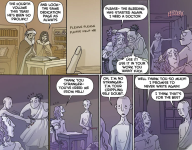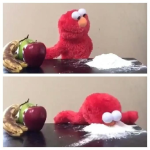As you know, a while ago, I tried to write a medieval-fantasy smut story. For about 10.000 words, everything was going well, until someone told me the names were not medieval enough. After days of futile attempts to find names that were medieval enough, I gave up that story.
Anyway, recently, I decided to try my luck with something without much smut. In fact, long ago, I did write a full urban-fantasy story (about 30.000 words), but I didn't publish it, because during the editing process, I couldn't figure out when to use contractions and when not to (e.g. She's or She is? It will or It'll? John is here or John's here?)
Recently, a professional, published author, unintentionally gave me the answer to that problem. Her name was Ursula Le Guin. When I came across one of her Earthsea books, I noticed she uses full forms (he is, did not etc.) in narration and contractions in dialogue. That pattern is simple and could rid me of that headache, so I decided to follow it. All I now needed to do was to go back to my urban-fantasy story, edit it according to that guideline regarding contractions/full forms, and it'd be ready to publish. Right?
Unfortunately, as it turned out, things were not so simple. My joy was short-lived. You see, this time, during the editing process, I realized there was another obstacle, which I hadn't noticed before: punctuation. When should I use semicolons? When should I use periods? When should I use em-dashes? It turns out I have three choices:
1. Keep it simple and use only periods. But I'm afraid this way some sentences will be unclear. For example: He won't be a problem to us. I took his gun. With a period, doesn't it sound as if the fact that I took his gun is something totally irrelevant to the fact that he's not a problem to us? I think it does. So if I use periods, the meaning will be unclear everywhere, and the readers will be confused and laugh at me.
2. Use semicolons whenever needed. However, I realized the cases like the example above are countless in my manuscript. Which means I'll have to use countless semicolons. And that will make my text look ludicrous. Besides, I have read in many articles that semicolons are ugly and confusing and draw the reader out of the story. Imagine how confused and drawn out the reader will be if I use countless of them.
3. Use semicolons sparingly. But in that case, how will I decide when to use them and when not to? I can't figure out any way to decide that. And what about colons? In many cases like the example above, I had originally used colons, because I had read in an article that they are a great way of putting more emphasis to what follows. Until someone told me it's wrong to use colons that way. And many people agreed, stressing I should use colons to introduce lists, so I went back and replaced all those colons.
Until a few minutes ago, someone told me, "Hey, by the way, you have another great option: colons." Which turns out that all the previous people were wrong and what I read in that article was right. Or not? I no longer know what to believe.
And so, seeing that I'll never be able to figure out how to use proper punctuation, I once again gave up. This time not just writing smut but writing any genre. I mean, if I can't punctuate properly, it doesn't matter what genre I write, so there's no point in keeping banging my head on that wall called "You'll never figure out how to punctuate." That wall will never break. Only my head will break if I keep banging it on there.
I have to accept I can't become an author no matter what I do.
Anyway, recently, I decided to try my luck with something without much smut. In fact, long ago, I did write a full urban-fantasy story (about 30.000 words), but I didn't publish it, because during the editing process, I couldn't figure out when to use contractions and when not to (e.g. She's or She is? It will or It'll? John is here or John's here?)
Recently, a professional, published author, unintentionally gave me the answer to that problem. Her name was Ursula Le Guin. When I came across one of her Earthsea books, I noticed she uses full forms (he is, did not etc.) in narration and contractions in dialogue. That pattern is simple and could rid me of that headache, so I decided to follow it. All I now needed to do was to go back to my urban-fantasy story, edit it according to that guideline regarding contractions/full forms, and it'd be ready to publish. Right?
Unfortunately, as it turned out, things were not so simple. My joy was short-lived. You see, this time, during the editing process, I realized there was another obstacle, which I hadn't noticed before: punctuation. When should I use semicolons? When should I use periods? When should I use em-dashes? It turns out I have three choices:
1. Keep it simple and use only periods. But I'm afraid this way some sentences will be unclear. For example: He won't be a problem to us. I took his gun. With a period, doesn't it sound as if the fact that I took his gun is something totally irrelevant to the fact that he's not a problem to us? I think it does. So if I use periods, the meaning will be unclear everywhere, and the readers will be confused and laugh at me.
2. Use semicolons whenever needed. However, I realized the cases like the example above are countless in my manuscript. Which means I'll have to use countless semicolons. And that will make my text look ludicrous. Besides, I have read in many articles that semicolons are ugly and confusing and draw the reader out of the story. Imagine how confused and drawn out the reader will be if I use countless of them.
3. Use semicolons sparingly. But in that case, how will I decide when to use them and when not to? I can't figure out any way to decide that. And what about colons? In many cases like the example above, I had originally used colons, because I had read in an article that they are a great way of putting more emphasis to what follows. Until someone told me it's wrong to use colons that way. And many people agreed, stressing I should use colons to introduce lists, so I went back and replaced all those colons.
Until a few minutes ago, someone told me, "Hey, by the way, you have another great option: colons." Which turns out that all the previous people were wrong and what I read in that article was right. Or not? I no longer know what to believe.
And so, seeing that I'll never be able to figure out how to use proper punctuation, I once again gave up. This time not just writing smut but writing any genre. I mean, if I can't punctuate properly, it doesn't matter what genre I write, so there's no point in keeping banging my head on that wall called "You'll never figure out how to punctuate." That wall will never break. Only my head will break if I keep banging it on there.
I have to accept I can't become an author no matter what I do.


